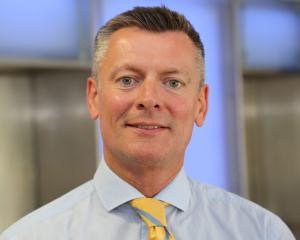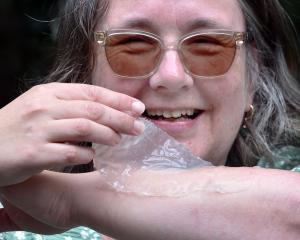Hidden among Dunedin's historic buildings, rhododendron gardens and trendy cafes is a community in which mothers, businessmen, labourers and the unemployed have one thing in common - drug addiction. Rosie Manins talks to a recovered opioid addict about getting high and staying clean in the city.
The 26-year-old Dunedin resident watched mothers deliberately hype up their children before doctor's appointments in the hope they would be prescribed Ritalin, which the mothers would take themselves or sell to fund their other drug habits.
Alice knew of suicide attempts, overdoses and petty crime. She did some "stupid things" herself.
Withdrawal from methadone and other opioids can do that to nice, normal people, she says.
They steal to pay for basic necessities, having spent all their money on drugs, or do so to buy drugs directly.
"Feeding your addiction becomes a priority. I just look back and think I was lucky to have an honest, supportive partner. Had I been with someone else it could have been a different story - it could have gone either way quite easily."
Alice's former partner, whom she met at the age of 19, shared her drug habit. He had been a longtime drug user.
When they met, Alice had spent a year in Dunedin becoming familiar with its nightlife, drinking alcohol, smoking marijuana and taking benzylpiperazine (BZP) party pills, which were legal at that time.
She was curious, a risk-taker and wanted to experiment. He was on the methadone programme and gave her the opportunity to try opioids for the first time.
Together they used cannabis, Valium and methadone.
"He didn't pressure me at all and told me it was a whole other ball game - he made that clear from the start. I wanted to try what he was taking. I wanted to be on that same level."
Alice moved to Dunedin from rural Otago to study, but when her polytechnic course was cancelled at the last minute she got work in retail.
She had a few relatives in the city, although she predominantly socialised with her partner and other drug users.
Alice loved the "motivated and uplifted" feeling methadone gave her, and injected its liquid form in the mornings a few times a week.
On other days she would have marijuana or Valium and occasionally Ritalin.
But methadone was her "premier drug of choice" and allowed her to function in a relatively normal way.
"Without realising it I got addicted to that motivation factor. I was just enjoying it and not realising at the time I was suppressing things I didn't want to deal with.
"I guess I fell in love with that initial rush. I enjoyed being stoned in general but ultimately it's that instantaneous high."
Alice developed a repetitive strain injury (RSI) at work and became a sickness beneficiary.
At the height of her drug use she was "on something" five to seven days a week.
"It probably took about four months, using methadone three times a week, before I noticed any withdrawal symptoms. It does kind of creep up on you."
Six months in she started buying methadone to supplement what her partner obtained and shared.
Alice says she managed to maintain a sense of control over her use, usually injecting about 30mg at a time. That amount would last the day and cost about $30.
"Withdrawal from using methadone four times a week is bad enough and luckily I didn't want to go the extra mile and do crazy stuff. I kept my tolerance low."
But she frequently experienced drug cravings, restless legs, hot and cold flushes, insomnia and sneezing during withdrawal.
Alice says prescription drugs, including opioids, are the most commonly abused in Dunedin.
"What I saw more and more frequently was young people recreationally use methadone, develop a habit and go on the methadone programme to get it for free.
"Drug users are anyone and everyone, including those you think are least likely to be using. The stereotype of addicts just being male criminals is bulls..."
After a couple of years, Alice's partner lost his methadone "takeaways" and she was forced to cut back.
Gradually she reduced her intake in an effort to find an amount she could use without suffering withdrawal.
"I was on two times a week for quite a while then decreased even further to once a week but I would still get withdrawal symptoms. It got to the point where I was sick of withdrawal and the whole drug scene."
Alice started seeing a homeopath and exercising. She twice attempted sobriety to get on an employment course and joined a local society, which led to a meeting with healer Sonny Chin.
"My intuition snapped into action and a voice in my head was telling me to go and see Sonny. He was my main source of help, other than a supportive partner and friends."
It took Alice a while to admit to herself she wanted to stop using drugs. Being honest with oneself is a hard task, she says.
"I had myself convinced that I used drugs because I liked them, which I did, but it was also to forget about issues I should have been dealing with. Drugs can be fun but people don't realise that can change very quickly.
"I found a new sense of clarity in admitting that I didn't actually like drugs."
Once clean, Alice found it difficult to maintain a relationship with her partner, who continued to use methadone and they separated after a few months.
She has been clean since July 2011 and tries to focus on the present.
"I do wonder how life would be different if I hadn't used drugs but the past is the past and it's important to just let things go."
Still unemployed, Alice does volunteer work and plans to study towards a career in social services.
"The majority of addicts are really nice people but their drug use gets the better of them."
She has rekindled contact with her parents, who she says suspected she was using drugs but never knew to what extent.
Alice practices Qigong and considers herself "one of the lucky ones".
"I don't see myself ever going back, I've made such a shift within myself. I see life completely differently and am learning to try and keep myself in as good a state as possible."
She wants others to know that help is available and not something to be afraid of.
Alice is happy to share her story in the hope it helps others struggling with addiction, and can be contacted through the Otago Daily Times.
*Name has been changed.












